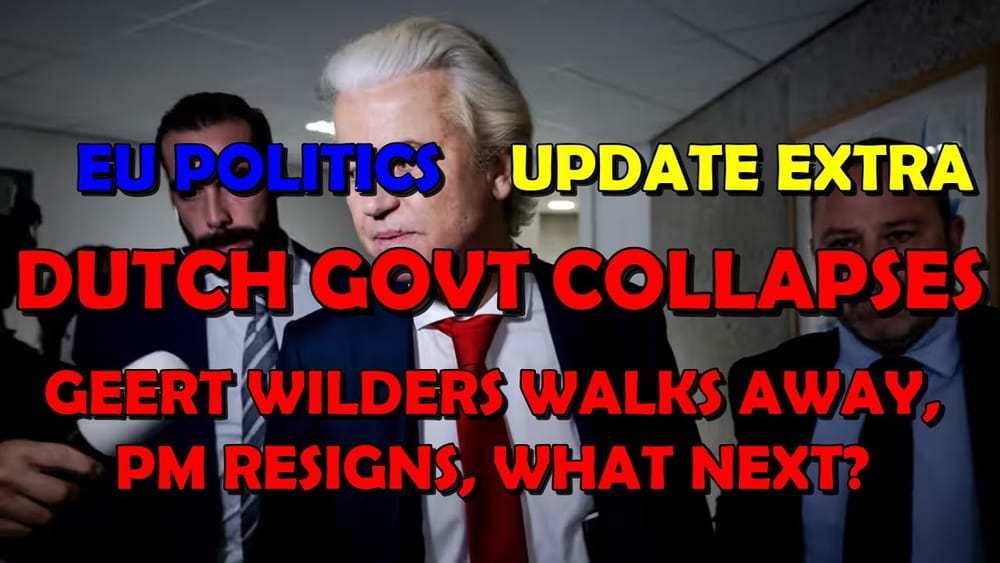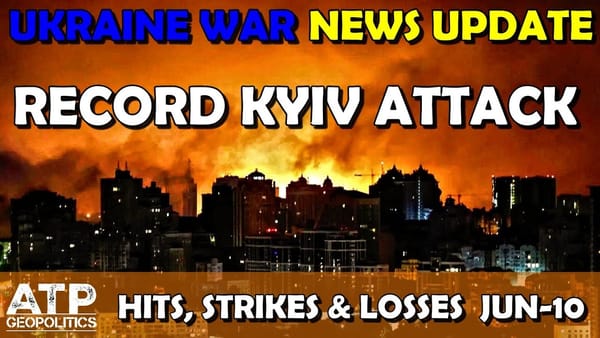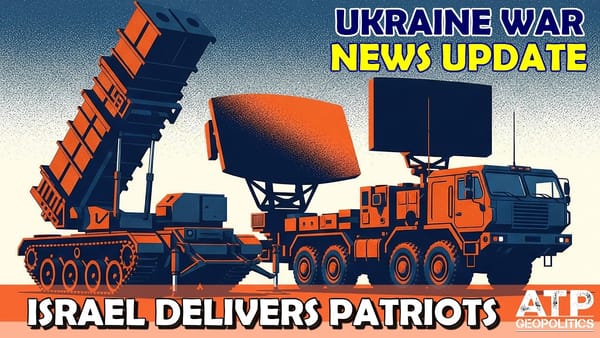Dutch Govt Collapses! PM Resigns as Far-Right Wilders Walks Away: EU Politics News Update
🤖
This summary has been produced automatically by an AI Large Language Model (LLM) without any human intervention. Whilst every effort has been made to prompt the LLM to produce accurate output, there may be inconsistencies, inaccuracies or hallucinations!
Table of Contents 📖
| Topic ID | Topic Title | Timestamp |
|---|---|---|
| 1 | Hello Team | 00:00-00:16⏩ |
| 2 | Dutch Government Collapses: Initial Details | 00:16-01:42⏩ |
| 3 | Reasons for Coalition Collapse: Immigration Dispute | 02:19-03:30⏩ |
| 4 | Reactions from Remaining Coalition Partners | 03:31-05:54⏩ |
| 5 | Analysis of Upcoming Elections and Political Instability | 05:54-08:44⏩ |
| 6 | Left-Wing Opposition and Ukraine Aid Implications | 08:44-11:23⏩
Return to top⤴️ Geert Wilders' Political Gamble and External Influence |
| 8 | Wrap up | 17:14-17:16⏩ |
Hello Team
🎦 00:00-00:16⏩
- Jonathan welcomes viewers to an "ATP Geopolitics European politics special" breaking news update.
- He announces that the Dutch government has collapsed.
Dutch Government Collapses: Initial Details
🎦 00:16-01:42⏩
- The Dutch Prime Minister, Dick Schoof, has stepped down.
- This follows Geert Wilders' decision to withdraw his anti-Islam Freedom Party (PVV) from the coalition government due to a dispute over asylum and immigration policy.
- The coalition comprised four parties: Wilders' PVV, the popular Farmer Citizens Movement (BBB), the centrist New Social Contract (NSC), and the liberal People's Party for Freedom and Democracy (VVD).
- Jonathan notes that such a large coalition is difficult to maintain and was "fairly fractious."
- He highlights that the PVV is generally not well-aligned with supporting Ukraine.
- The collapse means either a snap election (which appears likely) or the remaining coalition parties could have tried to form a minority government, but this was not deemed the best option.
Reasons for Coalition Collapse: Immigration Dispute
🎦 02:19-03:30⏩
- Drawing from a Guardian article, Jonathan explains that the collapse was primarily due to immigration policy.
- Wilders' announcement followed a brief meeting of the "fractious and fragile coalition," which struggled to reach consensus since its formation last July.
- The coalition took nearly six months to form initially and was "repeatedly undermined" by Wilders, who was not a cabinet member.
- Wilders pushed for a 10-point plan to radically reduce immigration and asylum, including:
- Enlisting the army to secure and patrol borders.
- Turning all asylum seekers back at the border.
- Closing refugee accommodation facilities.
- Sending all Syrian refugees home.
- Suspending EU asylum quotas.
- Banning family members from joining refugees already in the country.
- Jonathan notes that legal experts have stated several of these proposals breach European human rights laws and the UN Refugee Convention, to which the Netherlands is a signatory.
Reactions from Remaining Coalition Partners
🎦 03:31-05:54⏩
- Remaining coalition partners reacted with "anger and disbelief" to Wilders' decision.
- Dylan Yeşilgöz, the VVD leader (from former PM Mark Rutte's party), stated that PM Schoof had appealed to leaders to act responsibly, citing "enormous international challenges," a "war on our continent," and potential economic crisis.
- Yeşilgöz was "shocked" by Wilders' decision, calling it "super irresponsible," adding, "We had a right-wing majority and he lets it all go for his ego. He just doing what he wants. This is making us look like fools. He running away at a time of unprecedented uncertainty."
- Jonathan points out that forming a coalition, especially a right-wing one, took six months, making Wilders' move particularly impactful.
- Caroline van der Plas of the BBB party expressed extreme anger, stating Wilders was "not putting the Netherlands first. He's putting Geert Wilders first."
- Nicole van Vroenhoven of the NSC found the move "incredible and incomprehensible."
- While a minority administration was theoretically possible, most members favoured snap elections for "clarity and a strong government."
Analysis of Upcoming Elections and Political Instability
🎦 05:54-08:44⏩
- Jonathan brings in insights from JR, a Dutch individual who helps him with mapping and has similar political biases, broadly sitting on the left.
- JR's analysis indicates that Wilders' PVV is "big in the polls," though not as high as previously.
- Wilders pulled the plug over migration, gambling that making it a central election theme will benefit him, at least in the short run, by highlighting contrast with other parties.
- However, the gamble could backfire if voters blame him for killing the coalition or if the campaign shifts focus to stability, affordability, or Ukraine.
- The NSC, for example, is polling very low, exemplifying the coalition's deeper problems.
- The initial right-leaning supermajority of 88 seats (PVV, VVD, NSC, BBB) has "crumbled," with current polls showing them around 60 seats, well below the 76 needed for a majority.
- Jonathan explains that the Dutch parliament's structure, with many smaller parties, makes coalition formation challenging, hence the six-month struggle to form the previous government.
- He agrees with JR that the instability Wilders triggered "may end up costing not just him, but the entire bloc."
- All options are open, and it's unclear how the cards will fall, potentially favouring the opposition or other coalition members.
Left-Wing Opposition and Ukraine Aid Implications
- JR's analysis also covers the left: the merger of Green Left (GroenLinks) and PvdA (Labour Party) was meant to unify the progressive flank but is more an "alliance than synthesis."
- This combined left bloc holds steady in polls but lacks a "compelling, distinct pitch" beyond "not being Wilders," which Jonathan compares to the US Democrats' "not Trump" strategy in previous elections.
- For the left to lead, they need "sharper answers on security, climate and the cost of living" and must prove they are more than a "nostalgic centre-left revival."
- Significantly, while PVV and BBB claim to support Ukraine "in principle," they have consistently opposed "large-scale financial or military aid."
- Both parties prefer to keep Dutch money at home, which means rejecting most meaningful forms of assistance.
- Jonathan warns that if support for Ukraine becomes a "defining test of leadership and reliability," their reluctance could come under renewed scrutiny.
- Crucially, if the PVV wins and returns to government, "Dutch aid to Ukraine could be stopped or at least put under serious threat."
Geert Wilders' Political Gamble and External Influence
🎦 11:23-17:13⏩
- The key question now is how the PVV will be perceived: as a party that failed while being the largest and blamed others, or as a "brave and principled party" that needed more seats.
- Jonathan finds this a "really great way of seeing it."
- Even if Wilders wins again, the question remains who would want to govern with him, given the unresolved issues and the recent coalition collapse. He finds Wilders' move "odd" and potentially a "stumbling block" for forming another government.
- Jonathan suggests the US might get involved, similar to its actions in Poland, Germany, and Romania (less successful in Canada and Australia).
- He posits that the US might back Wilders, leveraging "identity, culture wars and freedom of speech" narratives to amplify the populist right.
- Jonathan expresses concern that the US appears to be "fighting the same battles as Russia" by amplifying the populist right in Europe. This aims to "disunite Europe, foment discord and bring that populist far right to power."
- While the US might do this from an ideological perspective (e.g., JD Vance, Heritage Foundation, Stephen Miller), Russia's goal is to pull apart the EU, which stands as a significant anti-Russia power structure.
- Jonathan finds it concerning that "the US and Russia seem to be aligned with wanting the EU to fall apart," with Russia seeing right-wing populism as a vehicle to undo the EU, and certain US factions ideologically desiring it.
- He mentions the uncommitted defence spending plans (3.5% or 5%) in the Netherlands, which were in research phase and ended with the cabinet's collapse, meaning no NATO summit commitment.
- Jonathan concludes that the situation is "very unfortunate" for Ukraine if the PVV gains power, but it could also be beneficial if Wilders' gamble backfires and another coalition takes over.
- He reiterates the plausible options: Wilders misreads the public and PVV's influence diminishes; a problematic coalition forms with Wilders' party despite unresolved issues; or PVV performs exceptionally well, but still requires coalition partners who might be unwilling; or PVV does very badly, leading to a left-wing or centre-right coalition without them.
- Jonathan admits he's "no expert on Dutch politics" but hopes his analysis, largely informed by JR, offers insight.
Wrap up
🎦 17:14-17:16⏩
- Jonathan thanks the viewers and bids them farewell until the next video.
🤖❓ AI Debrief (post task) - anything the AI didn't understand
The YouTube video title "Dutch Govt Collapses! PM Resigns as Far-Right Wilders Walks Away: EU Politics News Update" does not contain a date in the YYYYMMDD format as specified in Task 1. Therefore, I have used "N/A" for the date. Please clarify how to handle dates when they are not present in the YouTube title as per the given format.
0123456789




